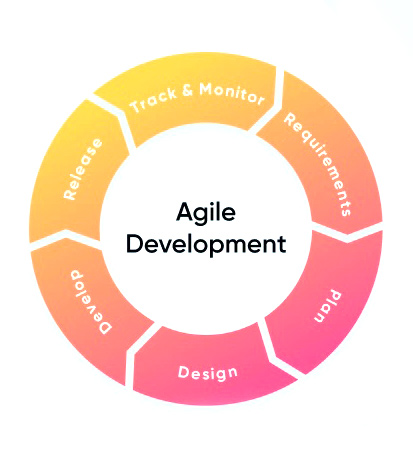
Managing the delivery of a digital product requires efficient communication schemes and coherent processes. With the right tools and agile methodologies, you can ensure your project focuses on delivering value and on-time results within budget.
One person, many responsibilities
We identify and monitor risks to predict uncertainties and minimize their project impact
We gather requirements and confirm priorities to deliver project goals
We test. We aim to deliver early. We adapt to the ever-changing environment
We use the right tools to make sure everyone is on the same page
We ensure efficient collaboration, interaction, and communication across teams
We estimate and keep track of your project headway
We adapt requirements to deliver the most value for less through control of your project's cost
We make sure we know what works - and avoid things that don’t
Need to manage the team’s work, put more focus on product thinking or improve agility of your whole company - Aikyne has you covered
Have your project managed in an agile way, adjusted to your needs with on time delivery and budget controls
Boost your team's collaboration to improve velocity and quality of your product
Maximise the value of your product and make sure that it meets business requirements
Apply Agile principles beyond the scope of your team and project - improve your general processes and inter-team cooperation

Project management is the key to the successful delivery of your product. Our effective model is based on an adaptive, incremental process that complements traditional project management with Agile practices to deliver the most value
We help you successfully deliver concept-to-product projects, implement iterative efforts to make your product better, and maintain a great relationship in the process
Envision, craft, and prioritize project needs based on your goals and business objectives
Manage development teams’ work based on requirements and feedback from previous phase
Product features are built by development teams and quality tested for flawless functionality
We establish testing mechanisms to match with your business requirements and users’ expectations
Once released, we can incorporate enhancements through maintenance or end-of-project services, based on your needs
We ensure constant improvements and ongoing adaptation to your needs and market changes
Agile is an iterative, flexible approach to software development that embraces the fact that requirements evolve as a product develops.
Project Management is the application of knowledge, skills, tools and techniques to project activities in order to meet the project requirements.
Agile Project Management controls software development by delivering work against requirements iteratively and incrementally. User needs evolve and we need to adapt to the changes that can occur throughout a project’s life cycle.
To create products that align with user needs and business objectives, we encourage short development cycles that continuously improve the product.
Requirements and solutions evolve through collaboration between customers, end users and self-organizing, cross-functional teams.
The Agile Project Management philosophy stems from the core values highlighted in the Agile Manifesto:
As agile proponents, we value:
and alike the Independent Signatories of the Manifesto for Agile Software Development, we also believe that there is value in the items on the right, yet we value the items on the left more.
Agile is an umbrella term for a number of methodologies and frameworks, sharing the principles and values described above. Each of them has its own areas of use and distinctive features. Organizations often utilize agile methods like Kanban or Scrum to improve time to market, quality, and happiness.
In a traditional project management methodology such as waterfall, managing project scope, budget, quality, talent, risk, monitoring and reporting status to stakeholders, adapting to changes, all fall under the responsibility of a Project Manager. Waterfall is a linear and less flexible software development model that breaks down the sequence of events in distinct stages and each stage must be finished before the next one can begin. This makes it very hard and potentially costly to go back in the delivery process and change something that’s already been completed.
Agile Project Management evolved as a response to the inflexibility of the waterfall approach. Its benefits rely on a process based on incremental progress with a strong emphasis on accommodating changes stemming from client feedback and focuses on efficient collaboration and self-organized teams. It fosters innovation, and introducing techniques that promote adaptability and flexibility in the face of unpredictable circumstances.
In a well-functioning Scrum team, there are 3 main roles:
Product Owner: responsible for maximizing the value of the product resulting from the work of the development team. It is the responsibility of a single person to perform this role and for expressing and prioritizing product backlog to ensure how to best achieve goals and mission.
Scrum Master: Serves as a servant-leader for the Scrum team in supporting and promoting Scrum theory, practices, rules and values with the aim to improve their flexibility and effectiveness through application of their knowledge in Agile practices, frameworks and methodologies.
Development team: A self-organizing, cross-functional team of people with specialized skills and areas of focus who collectively are responsible to take the product owner's vision and turn it into a tangible, incrementable, demonstrable product
Adaptation to change: thanks to an iterative process and prioritization capabilities, changes can be easily embraced and implemented through product development
Predictability: By using time-boxed, fixed schedules, costs and estimates are predictable which improves decision making about the priority of features and the need for additional iterations
Efficiency focus: With increased communication and shorter iterations, teams can focus on small pieces of a larger product. This results in increasing project control and efficient delivery.
Collaboration driven: Through increased communication and constant interaction to track progress, stakeholders and teams collaborate and share responsibilities towards a common goal
Quality and Customer-centeredness: Delivering working software frequently and focusing features on the prioritised needs of real customers increases trust in the team to provide the most business value.
Continuous improvement: At regular intervals, the team reflects on progress and value delivered to continuously evaluate and improve on efficiency and quality
In Agile frameworks, a sprint can last from one to four weeks. The length is chosen according to the flow and dynamics that we have in the project.
If we need to review our goals more often and control progress closer, we choose one-week sprints. If we have more ground to cover with each iteration, we can go with two week sprints. We can create many sprints at once on top of the backlog and plan for a longer period of time if needed.
Teams need to be cross-functional, so they often include multiple specialists in different areas - backend, frontend, design, quality assurance.
At Aikyne, we apply our Agile Project Management mindset, methods, frameworks to help your team work faster, focus on product thinking, increase flexibility, align with your user needs and embrace continuous improvement. Whether you’re an entrepreneur, startup, company owner or simply a project manager looking for better ways to structure the workflow of your team, we support you in implementing the best Agile Project Management practices and roles tailored to your needs, based on our extensive market experience.

Aikyne helps innovators maximise their products’ business value through implementation of Agile and Project Management practices.
Our team of 60+ multi-disciplinary and certified Project Managers, Scrum Masters, Product Owners and Agile Coaches have experience in international projects for startups and well-established enterprises. We will support you on your Agile journey.
Check out the other services that we have in our range. We deliver high-quality products on time. Hassle-free.
We provide expertise in both native and hybrid app development. We deliver iOS and Android applications.
Cutting-edge technology and reliable solutions tested in battle.
Design services range from ideation, to UI & UX design, research, product review, and digital branding.